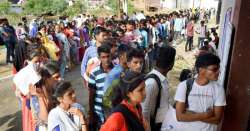CLAT 2020: Supreme Court quashes plea challenging online conduct of exam
The petitioner before the Supreme Court averred that this declaration of online mode for the conduct of CLAT violates the principle of "legitimate expectation". It was pointed out that aspirants have spent over a year preparing for the test believing that it would be held offline.

The Supreme Court on Wednesday refused to entertain a plea challenging the conduct of this year's Common Law Admission Test (CLAT 2020) through the online mode. The Consortium of National Law Universities had declared this year's CLAT through online mode. The plea challenging the conduct of the CLAT exam was filed by one Mitul Jain assailing the notification issued and was turned down by the Bench of Justices L Nageswara Rao, Hemant Gupta, and S Ravindra Bhat.
Through this notification, the NLU Consortium had announced that in light of the COVID-19 pandemic, the computer-based online exam would be held at centers across the country, on August 22.
The petitioner before the Supreme Court averred that this declaration of online mode for the conduct of CLAT violates the principle of "legitimate expectation". It was pointed out that aspirants have spent over a year preparing for the test believing that it would be held offline. The sudden change in the mode of the exam is adverse to the students, it was claimed.
Highlighting the overwhelming disparity in access to the internet, the petition claims that several aspirants would be at a disadvantage if the test was to be shifted from the offline mode to the online mode.
In the notification under challenge, the Executive Committee of the NLU Consortium had laid down the rationale behind opting for the online mode. It said:
"...the EC assessed the feasibility of conducting the Common Law Admission Test, 2020 (the “CLAT 2020”) through various modes. It concluded that an off-line test, as initially contemplated, would require large scale movement of students to limited centers, and significant logistics in the handling of question papers and answer scripts, which is not possible during the prevalent pandemic conditions."
The Court, after observing that every year some averments are made against the CLAT, declined to entertain the PIL.